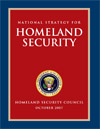Last week, the White House released an updated version of its National Strategy for Homeland Security. The Bush administration intends the document, which replaces the original July 2002 National Strategy hastily prepared in the aftermath of the Sept. 11, 2001, terrorist attacks, to provide an overarching framework for assessing all U.S. homeland security programs and policies. The new National Strategy provides a well-organized summary of the numerous organizational and programmatic changes that have occurred in the area of U.S homeland security since 9/11. For example, the Department of Defense has established its first combatant command -- U.S. Northern Command -- whose geographic area of responsibility includes the continental United States. Furthermore, a director of national intelligence rather than the head of the CIA (formerly co-hatted as the director of central intelligence) now coordinates all U.S. intelligence agencies. Under the general leadership of the U.S. Department of Homeland Security (DHS) -- which did not even exist when the original National Strategy was issued -- the federal government has worked with other public and private bodies to develop a series of specific policies and programs to address various homeland security issues. These include the September 2005 National Strategy for Maritime Security, the November 2005 National Strategy for Pandemic Influenza, the 2006 National Infrastructure Protection Plan, and the September 2006 National Strategy for Combating Terrorism, among others.
New U.S. Homeland Security Strategy Reflects Old Thinking

